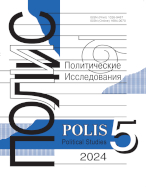Comparative Analysis of Politico-Administrative Reforms:
from New State Management to the “Governance” Conception 50
Smorgunov L.V.,
Dr. Sci. (Philos.), Professor, Head of the Political Governance Department, Faculty of Political Science, St. Petersburg State University, St. Petersburg, Russia, l.smorgunov@spbu.ru
elibrary_id: 208776 | ORCID: 0000-0002-2581-2975 | RESEARCHER_ID: H-4986-2013
DOI: 10.17976/jpps/2003.04.05
Smorgunov L.V. Comparative Analysis of Politico-Administrative Reforms: from New State Management to the “Governance” Conception 50 . – Polis. Political Studies. 2003. No. 4. https://doi.org/10.17976/jpps/2003.04.05
The author stresses that specialists in the field of new state management, recently, adopted a collective decision to give up the term "new state management", arguing that it is necessary to concentrate on the normative sources of public administrative practice. In the studies of managerial processes, significance of political science approach has risen. It turned out that separation of management from politics, on which the new state management had insisted, had no prospects. In fact, transition from the "new state management" conception to the description of managerial policy in terms of "governance", means change of methodological foundations of administrative reforms theory and practice and, consequently, of comparative political science. The "governance" conception embraces the mechanisms, processes and institutions through which citizens and groups express their interests, realize their legitimate rights, fulfill their duties and are balancing between differences. The general sense of the conception consists in that the state management becomes less rigid, less detailed, and less regulated; it turns out to be based rather on horizontal, than on vertical links between state organs, associations of civil society, and business.
 Full Text (электронная версия)
Full Text (электронная версия)See also:
Melville A.Yu.,
On Trajectories of Post-Communist Transformations. – Polis. Political Studies. 2004. No2
Peregudov S.P.,
Corporate Capital and Power Institutions: Who Plays the Master?. – Polis. Political Studies. 2002. No5
Kazantzev A.A.,
Intelligentsia and Structural Innovations in Political Expanse (An Essay of Comparative Analysis). – Polis. Political Studies. 2007. No1
Sergeev V.M.,
How Are Social Changes Possible? (Prolegomena to a Statistical Theory of Social Networks). – Polis. Political Studies. 2001. No6
Rabotyazhev N.V.,
Phenomenon of “Right-Left” Coalition in Russia: National Salvation Front. – Polis. Political Studies. 2004. No4





.jpg)






 print
print.jpg)
.jpg)